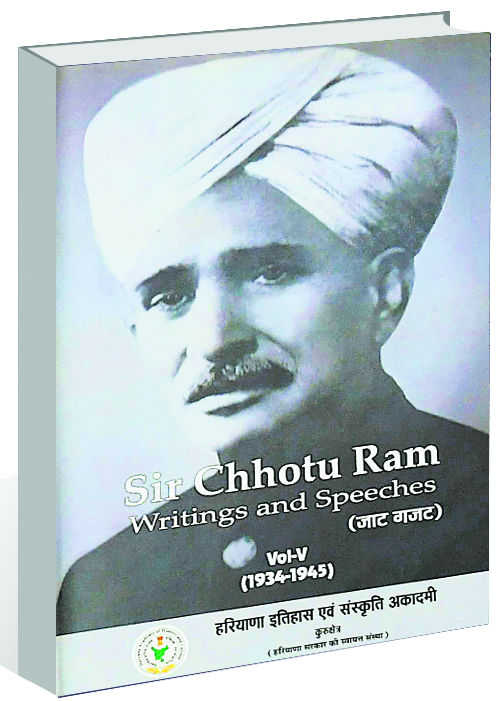
Sir Chhotu Ram – Writings and Speeches Edited by Dr Raghuvendra Tanwar. Haryana Academy of History and Culture. Volumes I-V. Set for Rs 2,500
Ram Varma
He was the youngest of three brothers in the family and they affectionately called him Chhotu (the little one) — the name stuck. He was born in a small farmer’s house in the Jat heartland of Rohtak district in 1881 and was married at the tender age of 12 when he was studying in the primary school at his village, Sampla. Though a late starter, he was extremely bright in studies and in Class V examination had stood first in the district.
He joined the middle school at Jhajjar and was a topper again. He was awarded a scholarship and joined the St Stephen’s High School, Delhi, in 1900. Subsequently, he graduated from St Stephen’s College in 1905.
His dream was to be a lawyer and he enrolled himself in Lahore Law College. But finding no means to support himself in Lahore, he later went to Agra Law College. Subsisting by teaching in a school in spare time, through sheer grit and determination he earned his LL. B. degree in 1912 and started practice at Rohtak.
He struck friendship with Mr Harcourt, deputy commissioner, Rohtak, and became influential. He provided prodigious help to British government in mobilising Army recruitment for World War-I. He also became a functionary of the Indian National Congress and found himself at crossroads.
The crisis of conscience came when after the end of the war in 1918, the British government enacted the Rowlatt Act, arming itself with draconian powers of detention — ‘no charge, no trial, no appeal’. Mahatma Gandhi called it ‘diabolical’ and started his first satyagraha against it. Chhotu Ram supported it in a Congress meeting held at Rohtak. Gandhi was de-trained while going to Amritsar after the massacre of Jallianwala Bagh took place on the Baisakhi day, 13 April 1919.
Commissioner H.A. Casson wrote a letter on April 16, 1919 to Chhotu Ram’s colleague Chaudhary Lal Chand pointing out Chhotu Ram’s ‘treachery’, saying: “He cannot accept gifts from Government with one hand while endeavouring to strike Government with the other.” Casson was referring to a land grant Chhotu Ram had received recently. Chhotu Ram recanted in a letter he wrote to Casson on April 27, denying that he had supported the non-cooperation movement He further tried to make amends by vehemently denouncing the satyagraha in his periodical, Civil & Military Gazette. He wrote: “With the mob, passive resistance turns into active resistance and Satyagraha quickly degenerates into Duragraha.”
He resigned from the Congress and wrote several letters to RC Bolster, ICS, who had replaced Harcourt as deputy commissioner, Rohtak, pledging his loyalty and unstinted support. In November 1920, Lala Lajpat Rai and Pandit Neki Ram had organised a public meeting in support of Non-Cooperation Movement at Rohtak. Chhotu Ram spoke against it and was greeted with shouts of ‘Shame! Shame!’ Indeed, he was confident of getting majority support and passing a motion against it!
The realisation dawned on him that he could not afford the luxury of joining the Freedom Movement. Later, at a farmers’ conference in Lyallpur in 1935, he had said: “I know the difficulties of poor zamindars because I have lived like a poor man, unlike Mr Gandhi and Pandit Jawaharlal who can’t conceive the effects of poverty.”
In November 1923 he was elected to the Punjab Legislative Council from the Rohtak rural constituency. He was an astute parliamentarian and a facile orator with an enviable command of the English. The welfare of the toiling agriculturist class was uppermost in his mind; to save the unlettered peasant from the exploitation and extortion of the money lender and rid the farmer of his perennial poverty was the mission of his life. Through his untiring efforts and perseverance he succeeded in his mission in a large measure.
Just three months after his election, in February 1924 he moved a resolution for providing additional irrigation facilities to Hissar and Rohtak districts. He recapitulated the assurances given by the Governor of Punjab, Sir Michael O’Dwyer, in open darbars in 1919 of constructing a dam on River Satlej. Again and again in his long political career he reverted to the issue of construction of the Bhakra Dam and tried his best to expedite the project.
He was a votary of Hindu-Muslim unity and joined the Unionist Party which espoused this cause. When it secured majority in the Council, he became Agriculture Minister in September 1924 and Education Minister after six months. In 1927, he was elected leader of the Unionist Party and functioned as the leader of opposition. When elections to the Punjab Legislative Assembly were held in 1936, he was elected from the Jhajjar constituency. The next year the title of Rai Bahadur (a desi variant of knighthood) was conferred on him. In September 1937 he was appointed Development Minister in Sikandar Hayat government and in 1941 he became the Revenue Minister, thereby earning the distinction of heading all important departments of the government.
This great son of Haryana breathed his last on January 9, 1945. Mahatma Gandhi sent a moving condolence message to his wife Gyano Devi. His legacy continues; his grandson Chaudhary Birender Singh has headed many important ministries in Haryana in his distinguished political career and is the Union Minister of Steel at present.
Director of the Haryana Academy of History and Culture, Dr Raghuvendra Tanwar has accomplished this long pending Herculean task of compiling Rai Bahadur Chhotu Ram’s writings and speeches in elegantly produced volumes. Besides, the Academy has also got his Urdu articles, published in Jat Gazette, translated by eminent scholars of Urdu and Persian and published them in two separate volumes.



























